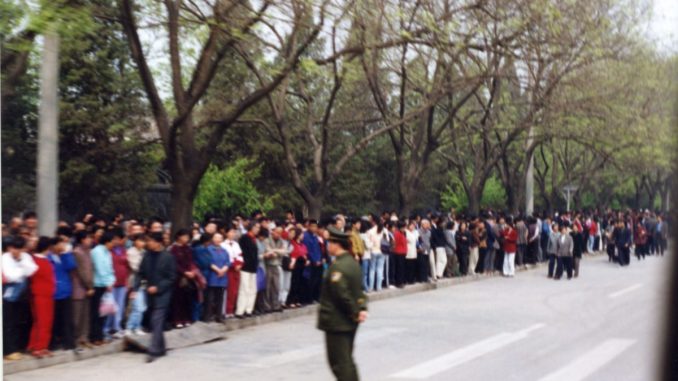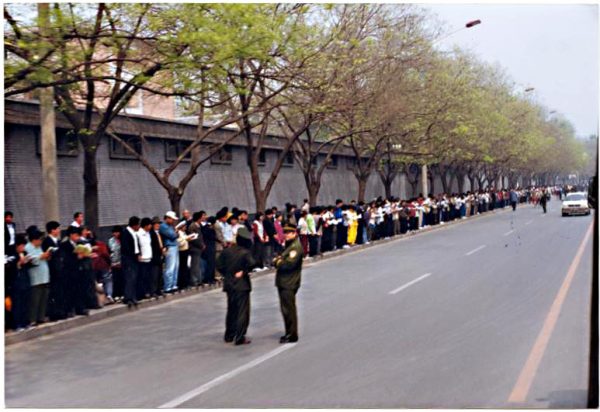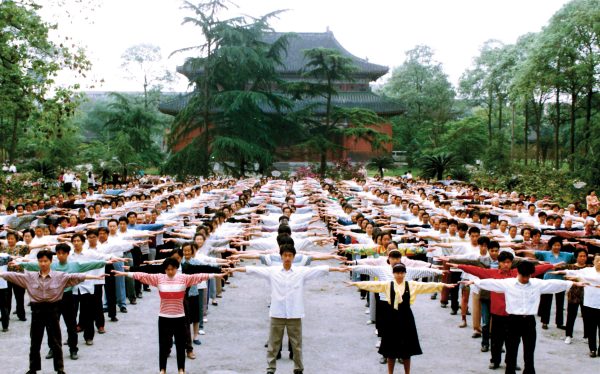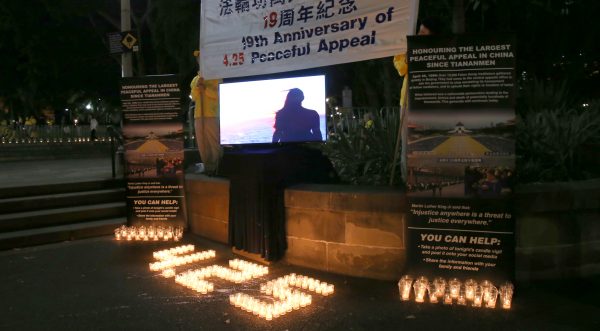
This year marks the 22nd anniversary of the April 25 appeal, the largest peaceful appeal in China after the Tiananmen Square Protest in 1989.
On April 25, 1999, over 10,000 Falun Gong practitioners gathered outside the Appeals Office of the State Council in Beijing to ask the authorities to release fellow practitioners who had been wrongly arrested (and beaten) by police in Tianjin Municipality, according to Faluninfo.net.
The arrests in Tianjin came after three years of intense official oppression, in which time Falun Gong books were banned from publication, the first propaganda article smearing Falun Gong was published in a major state-run newspaper, and police began disrupting group exercises sessions in parks.
During the silent and peaceful gathering, the premier of the Chinese Communist Party (CCP) at the time, Zhu Rongji, won international acclaim for peacefully resolving the problem by engaging with practitioners in dialogue.
However, this all changed overnight when Jiang Zemin, the then-leader of the CCP, overthrew Zhu’s decision and initiated what has become one of the longest-running persecutions against people of faith in China.
Since July 20, 1999, many thousands of Falun Gong practitioners have been arrested, thrown into labour camps, beaten, tortured, and killed for their organs by the CCP.
Li Yuanhua, a former professor at China’s Capital Normal University, who now resides in Sydney, Australia, attended the April 25 gathering after hearing about the arrest of practitioners in Tianjin from his mother. She asked him to accompany her to the National Public Complaints and Proposals Administration, which was only a few kilometres from their home.
“The purpose of us going there was quite simple,” Li said. ” There was only one purpose. Because I benefited [from the practice] myself … I wanted to tell the government the positive changes that I experienced, physically, spiritually, all aspects … to tell them that this is a good practice. That’s all.”
Li told The Epoch Times that what sticks with him from that historic day was the peacefulness and the calmness with which those who gathered conducted themselves.

Li explained that the Falun Gong practitioners also showed care for others by proactively occupying only one-quarter of the footpath and making sure they did not leave any litter behind.
“I remember there was one practitioner holding a plastic bag and walking to others one by one, saying, ‘Fellow practitioners, do you have any garbage [that you need to get rid of]? If you do, please drop it in this bag,’” Li said.
“Before the afternoon, we learned that the premier had come out and asked some practitioners in to learn about the situation. There were practitioners giving us live updates all the time, so everyone was waiting for the result.”
“At around 8 or 9 p.m. someone came out and told us that the practitioners in Tianjin had been released, so everybody just left.”

Li also noted that the police attending the gathering were relaxed and there had been no threat of aggression on either side, with some people even bringing their young babies with them.
“The policemen were scattered. They were quite relaxed, smoking and chatting. You can see from the policemen’s reactions that these people were kind and didn’t mean to attack,” Li said. “Who would besiege you holding a baby?”
Further, he said that what was most precious was that those who attended the appeals office were so disciplined.
“The footage itself [shows this]. So many people went there to report the situation, yet they could remain quiet and not be noisy. It made people wonder what’s behind them that made them behave so well.”
“And the result turned to be good as well,” he said, referring to the initial reprieve by former premier Zhu Rongji.
“But Jiang Zemin was actually afraid of the discipline shown by this group of people,” Li explained. “Bad people are really afraid to see good people. If it were a wise monarch, he would be pleased to see his people with such a high quality, but the CCP is a party that stole the power and rules people by violence.”
Li explained that under Jiang Zemin, the party soon began to re-characterise the appeal as something more aggressive as the leader of the CCP stepped up his attack on people of faith in China.
“At first, [the CCP] called it a gathering and it didn’t mention Zhongnanhai (the CCP headquarters),” Li said. “Even after the [April 25] incident, the CCP’s own report called it a gathering. It’s after the persecution started that [the narrative] changed and [the CCP] called it besieging Zhongnanhai [to frame the practitioners].”
But Li noted that the term besieging made no sense.
“We didn’t surround it in the first place, so how could we besiege them? The CCP couldn’t find a single photo of us besieging the place,” he said.
Recovery From a Terminal Disease
Li’s choice to speak up for his fellow practitioners who were imprisoned was something he felt he had to do because he had benefitted so much from the practice and its moral guidance.
Li first started practising Falun Gong in 1994 after he spent a decade looking for ways to cure his hepatitis B, an incurable condition at the time in China.
He tried all kinds of treatments including traditional Chinese medicine, Western medicine, some folk methods, and Qigong practices but he found nothing improved his condition.
“For the 10 years I was basically [fighting with] this disease and the impact it brought upon me, both physically and psychologically,” Li said. “I felt slow and sluggish inside.
“When I woke up in the middle of a night I would just sit there and not sleep again, fearing that I may die.”

“And I dared not date, because the disease is infectious,” he said.
After practising Falun Gong, Li said he began to not feel so uncomfortable any more and was able to move forward in his life. He noted that the next time he did a physical exam before coming to Australia in 2006, he found all his medical results were normal.
But Li said he benefited most from the mental change the practice brought about in him.
A Genuine Moral Uplift
“The change in my mind was fundamental,” the former professor said. “After cultivating, I knew how to be a good person and a good teacher.”
At that time, the university that employed Li asked students to rate their lecturers anonymously, which put the lecturers under a lot of pressure. Some chose to let students pass no matter what in the hopes of receiving a good remark. Li, on the other hand, decided not to do so. Instead, he guided the students using moral principles, such as explaining patiently to them why plagiarism is not good for them.
“Students know that if you really care for their growth, so they’ll give you kind feedback,” Li said.
Li also found the teachings of the practice, which emphasise truthfulness, compassion, and forbearance helped him professionally.
A professor of historical education, Li taught his students about the teachings of Confucius, Mencius, and Zhu Xi, which involved discussions on how to conduct oneself.
Previously, he had not really understood the essence of their teachings and simply echoed what the books said. But after starting Falun Dafa and reading the lectures given by the founder, Li Hongzhi, he realized that the ancient teachers were also talking about self-improvement through morality.
Li Continues to Speak Out
Li continues to speak out against the persecution of Falun Gong practitioners and he believes the period of time in which the persecution has taken place will be remembered as a special moment in history.
“It is very precious in both Chinese and world history. No matter how unfairly they [Falun Gong practitioners] were treated, this group of people wouldn’t show any intention to attack. They were just stating facts and hope you can come to a right judgement after listening to the facts.”
This is despite facing persecution, torture, and human rights abuses like organ harvesting, which have forced many Chinese people of faith away from their homes and into exile in other countries.
“What is most touching to me is the peace and rationality shown [by Falun Gong practitioners] under the violent rule of the CCP,” Li said sincerely.






Be the first to comment